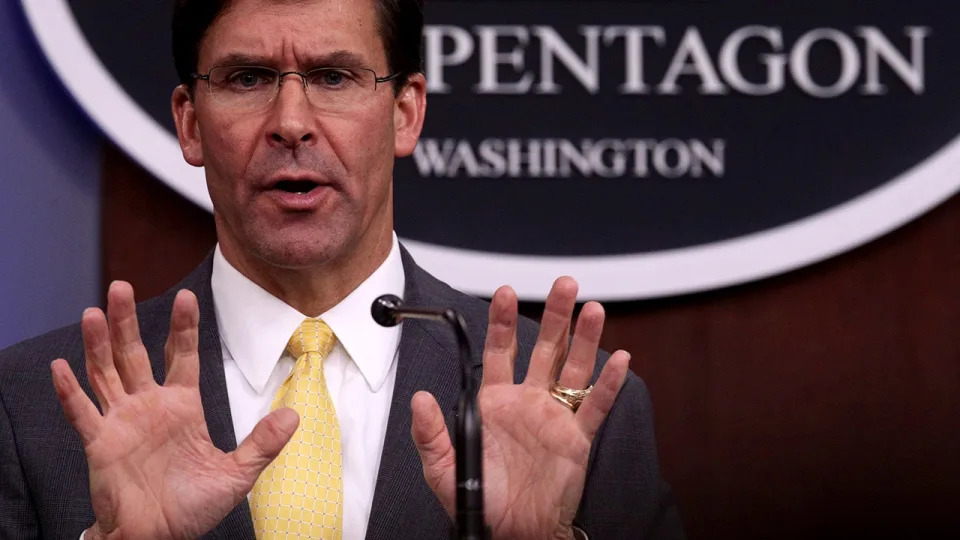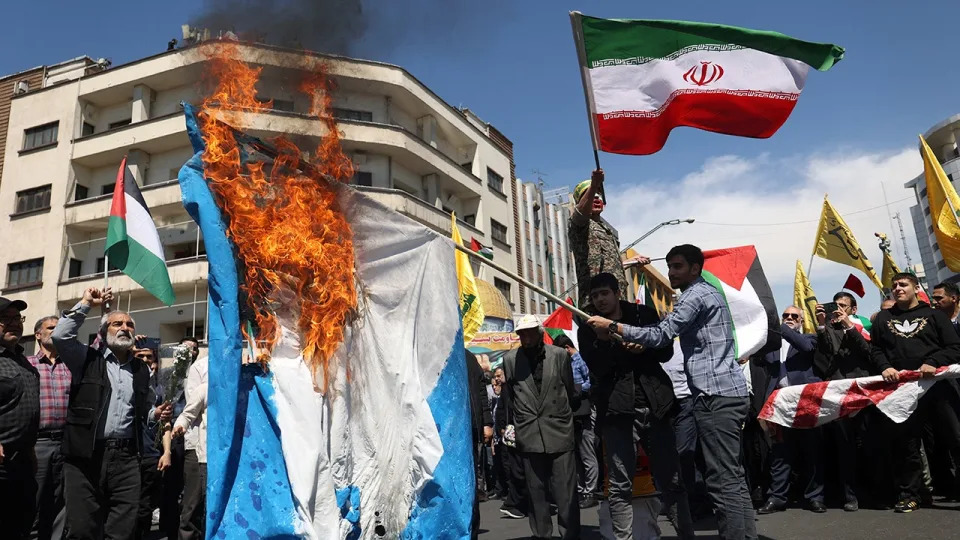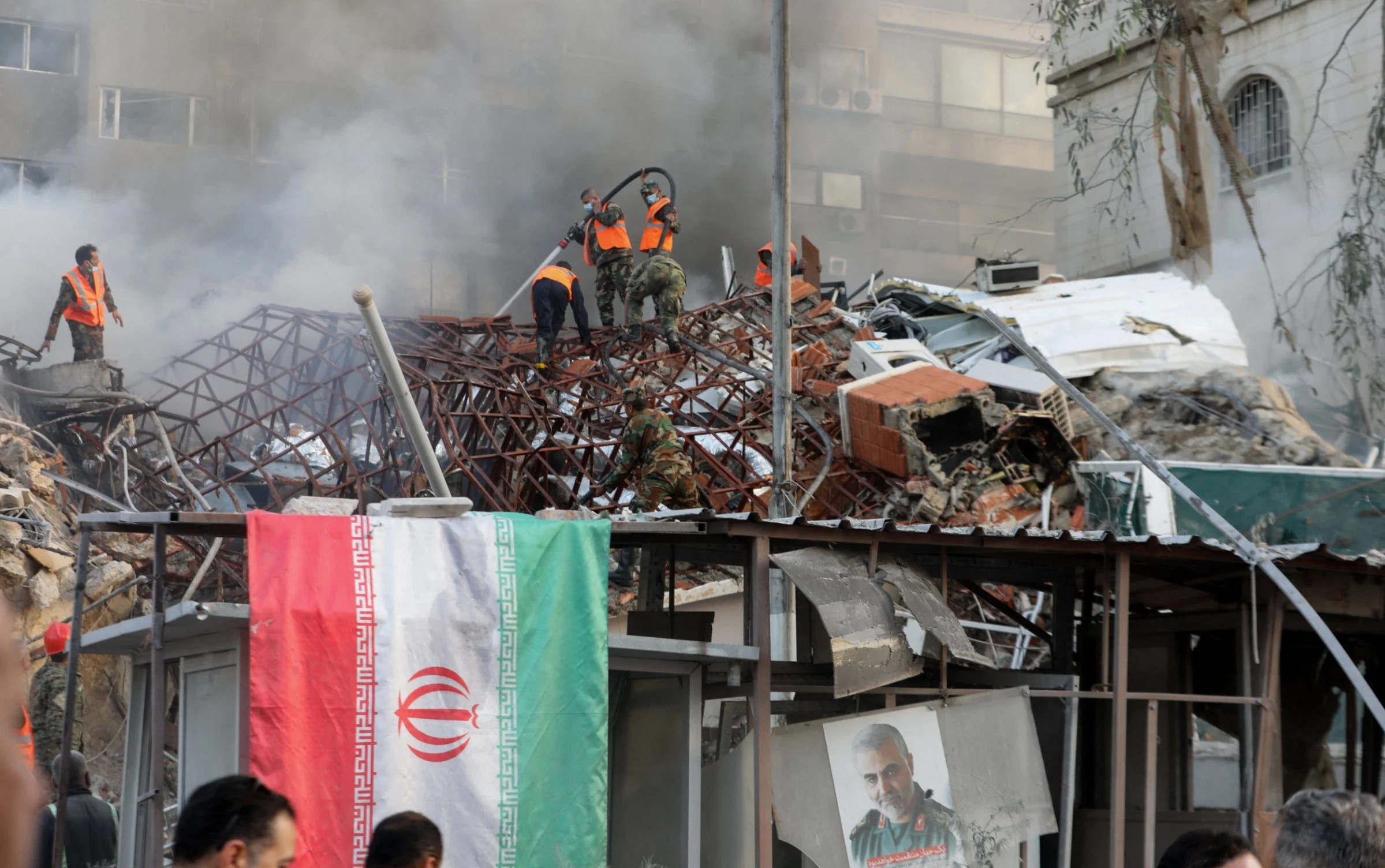The primary purpose of the Iranian consulate in Damascus, which was hit by an Israeli air strike this week, has likely never been the dispensing of visas for those wishing to visit the Islamic Republic. Its real function has seemingly been to act as a command and control centre for Iran’s Islamic Revolutionary Guard Corps (IRGC), enabling Tehran to operate its terrorist network throughout the Middle East from the heart of Damascus.
Since Hamas launched its deadly attacks against Israel on October 7, the consulate has served as Tehran’s main regional command centre, helping to supervise the activities of the Iran’s so-called “axis of resistance”, a diverse group of terrorist organisations including Hezbollah, Hamas and Yemen’s Houthi rebels that have vouchsafed their commitment to Israel’s destruction.
Given this, the Israel Defence Forces (IDF) were entirely justified in launching Monday’s missile strike on the base, which succeeded in killing several senior IRGC commanders. The attack needs to be seen in the context of an escalating proxy war between Tehran and Jerusalem that has intensified in recent months. Prior to October 7, Israeli warplanes were regularly in action attacking Iranian and Hezbollah targets in Syria in an attempt to disrupt the IRGC’s efforts to expand its military presence along the Syrian border with Israel.
Israeli military activity has increased significantly since then, not least because Hezbollah and other Iranian-backed militias have used their bases in Syria and southern Lebanon to launch a series of rocket attacks against the Jewish state. This constant bombardment has left large swathes of northern Israel desolate with many Israelis forced to abandon their homes and seek shelter in the main urban areas further south.
The IDF’s response has been to launch a series of air strikes in Syria targeting key IRGC commanders, including December’s assassination of Razi Mousavi. A key calculation in its willingness to attack Iranian targets in Syria has been that, for all Tehran’s bluster about supporting Hamas, the Islamic Republic has little appetite for a direct confrontation with Israel, preferring to use its proxies, such as Yemen’s Houthis, to do its dirty work.
Concerns that Israel’s latest attack could finally provoke Tehran to retaliate are certainly being taken seriously in Jerusalem after senior IRGC officials warned that the Israeli action will not go unanswered. The IDF has cancelled leave for all combat units while mobilising more reservists for air defence units in anticipation of an Iranian attack.
Just how much Iran will want to escalate tensions in the region, though, is a moot point. The last time the IRGC suffered a major setback, when the Trump administration assassinated another Quds Force chief, Qassem Soleimani, at Baghdad airport in 2020. The Iranian Supreme Leader vowed “tough revenge” in response, but ultimately there was no follow through.
Similarly, Iran will be wary about becoming involved in a direct military confrontation, not least because the Israelis have made it abundantly clear that, in the event of an Iranian attack, it will respond by destroying Hezbollah’s terrorist infrastructure in southern Lebanon and Syria, just as it is doing to Hamas’s in Gaza.
For all their grand-standing about wiping Israel off the map of the Middle East, the ayatollahs are well aware that, if it came to direct hostilities, they would be no match for the Israelis’s superior firepower.
Former defense secretary predicts Iran will strike at Israel
Former Defense Secretary Mark Esper on Friday said Iran is likely to retaliate against Israel for a recent missile strike that hit Tehran's consulate in Damascus, Syria.
Israel has not claimed responsibility for the strike, which killed senior Revolutionary Guard Corps (IRGC) commander Mohammad Reza Zahedi. Reuters cited a Lebanese security source as the first to identify Israel as the responsible party, to which an Israeli military spokesperson responded, "We do not comment on reports in the foreign media."
In an interview on CNN, Esper predicted Iran will take action against Israel, but on a limited scale to avoid wide-scale war in the Middle East.
"They are going to act," Esper said Friday. "They're going to feel the need, to uphold their dignity, to maintain credibility with their proxies, throughout the region, and to really meet the demands of hardliners, within the theocracy that wants to see something done."

"But on the other hand, they're not going to want to make this a wider war," he continued. "They don't want to escalate. They know that a major conflict with Israel, let alone Israel and the United States would be disastrous for Iran. So, I suspect that they will limit the attack to Israel, Israeli targets."3
Iran has said it reserves the right "to take a decisive response" after the purported Israeli strike, which killed six other Iranian military advisers in addition to Zahedi.
A senior Biden administration official told Fox News Digital that President Biden and Prime Minister Benjamin Netanyahu spoke about the threat from Iran on Thursday.
ISRAELI POLICE THWART ALLEGED ISIS TERROR PLOT AGAINST JERUSALEM STADIUM, POLICE STATION

"Our teams have been in regular and continuous contact since then. The United States fully supports the defense of Israel against threats from Iran," the official said.
Two U.S. defense officials said U.S. force posture has not changed in the Middle East since before Israel's air strike in Damascus. The U.S. is monitoring the situation given the increased rhetoric from Iran, but has not made any changes to prepare for a significant attack.
"Nothing has changed from a force projection standpoint," one official said.
US TROOPS WARNED TO BRACE FOR RETALIATION FROM IRAN AFTER STRIKE KILLS TOP COMMANDERS
Though Israel has not taken credit for the strike on Iran's consulate, the IDF has made several operational changes, such as canceling leave for any IDF personnel and calling up additional reservists to bolster the force’s air defense systems on Israel’s northern border, The Telegraph reported.
Israel has also suffered widespread GPS disruptions on applications, with some users shown to be in Lebanon’s capital Beirut, which Israeli outlet Haaretz reported as deliberate attempts to confuse Israeli drone threats.
IDF spokesperson Daniel Hagari reiterated the multifaceted conflict Israel is fighting, saying, "We are in a multi-front war. We are looking not only at Hamas but all our enemies. We look at all fronts and all threats in order to be ready for any scenario."



